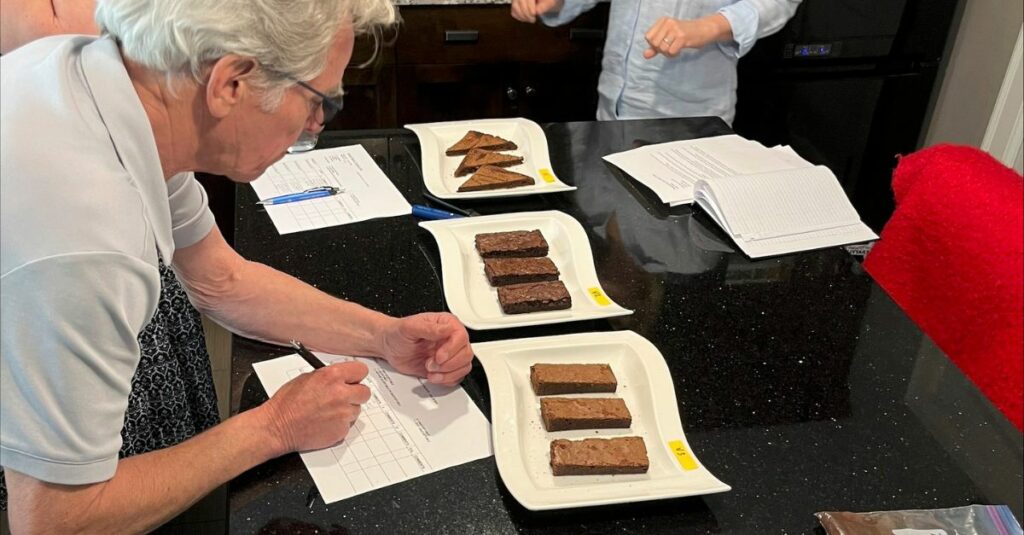
By Lilian Schaer for Bioenterprise Canada
More than 2.25 billion cups of coffee are consumed around the world every day, generating an estimated 57 million kilograms of spent coffee grounds. In Canada alone, this figure is pegged at two million kilograms a day or 80 tractor trailer loads of coffee grind waste – the vast majority of which is discarded.
RFINE Biomass Solutions Inc., a Nova Scotia-based start-up, has come up with an innovative solution that will let coffee shops upcycle their waste coffee, reduce greenhouse gas emissions, and generate new value from what until now has just been a burdensome problem.
“Spent coffee grounds are rich in fibre, protein, and antioxidants, components that are underutilized,” explains RFINE President and Co-Founder Quinn Cavanagh. “It’s a resource we spend water, energy, time and fuel on to grow and transport, but then we don’t use because it is highly dispersed in coffee shops and collecting it is economically and sustainably challenging.”
That’s why RFINE is focusing on solving the logistics burden of collection by building an in-store collection and processing solution that removes water from the spent grinds. The leftover, much lighter dry grinds are collected through existing logistics channels and handed off to animal feed and human food ingredient manufacturing partners.
“This wet, heavy waste goes to landfill right now, with a truck producing carbon dioxide to get it there and generating methane once it is decomposing,” adds co-founder Gordon Neal. “A typical busy coffee outlet has a carbon footprint from just this waste of 133 metric tons of CO2 per year, about the same as 30 cars would emit per year, so by taking it out of the waste stream and converting it, we’re removing that carbon footprint.”
RFINE turned to Canada’s Smartest Kitchen in Prince Edward Island for help in identifying applications for the dry grinds. According to Neal, the product could be used as an ingredient in chocolates, brownies, cookies, ice cream sandwiches or breakfast protein bars, for example. At the same time, they discovered that black soldier flies, which are raised as an alternative protein source, love spent coffee grinds.
As a result, RFINE now has an arrangement with a Nova Scotia insect producer and New Brunswick food company to buy virtually all of the material they’re currently collecting in Atlantic Canada.
The team is still working on refining the prototype of its in-store collection and processing machine, but they have lined up five local restaurants, including two major international brands, who will be part of the first phase of in-store testing starting in early 2024.
“They’re going to trial the machine and give us feedback, and as soon as those are tested, we are working on getting an expanded trial in place with more stores,” Neal says, adding that RFINE is collaborating with SureShot, the company that makes sugar and dairy dispensers for major chains, as its manufacturing, service installation and support partner.
Invaluable in getting their prototyping work off the ground was a grant from the GreenShoots program, which is delivered by Bioenterprise, Canada’s Food & Agri-Tech Engine.
This helped RFINE develop the requirements and the initial conceptual design and complete an early case study with over 100 coffee shops to gather data on how much waste is being generated, how much water is in the waste, how and how frequently it is collected, and what the costs are associated with that collection.
“This all helped us evolve into what the machine has to look like and do in order to be used in-store and work with two really senior product development people to get the appliance built,” Neal says. “There isn’t a lot of program money like GreenShoots that lets you hire experts, so the funding was timely and very appropriate.”
Through the funding, RFINE also became connected with Bioenterprise Canada and its advisory service. It was the Bioenterprise team that made critical introductions to human food and animal feed ingredient companies that have been a vital part of the company’s development.
“We think this can have an impact on a massive waste stream in a way that is feasible and economical,” adds Cavanagh. “We have a smart process design that will let us collect spent coffee waste in a cost-effective way and go about sustainability with a profitable, scalable approach that is food grade, safe and traceable.”
The GreenShoots program by Invest Nova Scotia, the Nova Scotia Innovation Hub and Bioenterprise Canada supports early-stage technology companies in the agriculture, agri-food, bioeconomy, clean technology and related sectors.
Bioenterprise is Canada’s Food & Agri-Tech Engine, a national agri-technology focused commercialization accelerator. Bioenterprise uses its more than 20 years of industry experience and a global network of experts, mentors, funders, researchers, and industry partners to help small and medium-sized agri-food businesses connect, innovate and grow.

-30-
Follow Bioenterprise on social media or subscribe to our channels for the latest industry news, events, and business development opportunities.